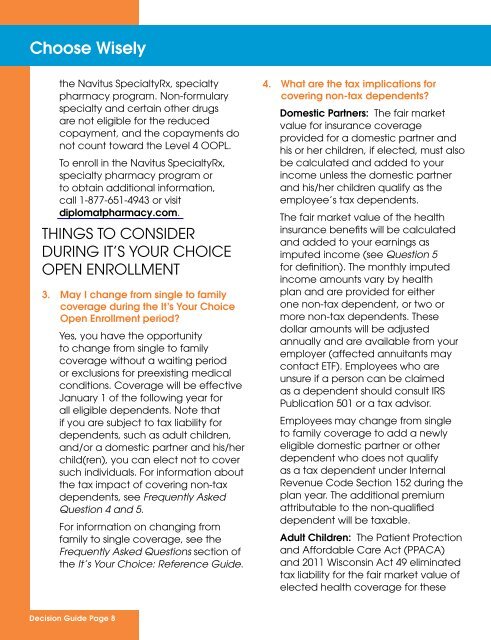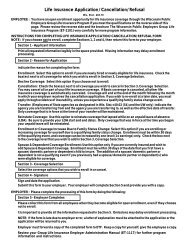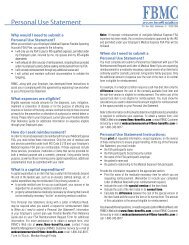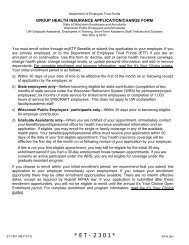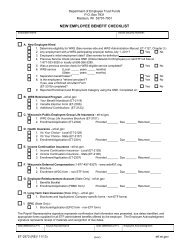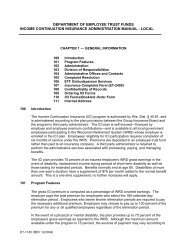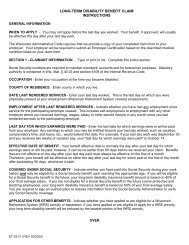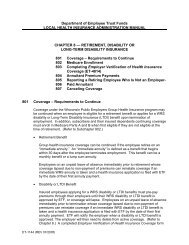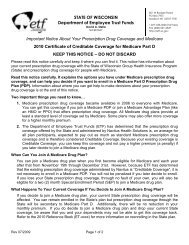It's Your Choice 2013 - Decision Guide (ET-2128d-13) - ETF
It's Your Choice 2013 - Decision Guide (ET-2128d-13) - ETF
It's Your Choice 2013 - Decision Guide (ET-2128d-13) - ETF
Create successful ePaper yourself
Turn your PDF publications into a flip-book with our unique Google optimized e-Paper software.
Choose Wisely<br />
the Navitus SpecialtyRx, specialty<br />
pharmacy program. Non-formulary<br />
specialty and certain other drugs<br />
are not eligible for the reduced<br />
copayment, and the copayments do<br />
not count toward the Level 4 OOPL.<br />
To enroll in the Navitus SpecialtyRx,<br />
specialty pharmacy program or<br />
to obtain additional information,<br />
call 1-877-651-4943 or visit<br />
diplomatpharmacy.com.<br />
THINGS TO CONSIDER<br />
DURING IT’S YOUR CHOICE<br />
OPEN ENROLLMENT<br />
3. May I change from single to family<br />
coverage during the It’s <strong>Your</strong> <strong>Choice</strong><br />
Open Enrollment period?<br />
Yes, you have the opportunity<br />
to change from single to family<br />
coverage without a waiting period<br />
or exclusions for preexisting medical<br />
conditions. Coverage will be effective<br />
January 1 of the following year for<br />
all eligible dependents. Note that<br />
if you are subject to tax liability for<br />
dependents, such as adult children,<br />
and/or a domestic partner and his/her<br />
child(ren), you can elect not to cover<br />
such individuals. For information about<br />
the tax impact of covering non-tax<br />
dependents, see Frequently Asked<br />
Question 4 and 5.<br />
For information on changing from<br />
family to single coverage, see the<br />
Frequently Asked Questions section of<br />
the It’s <strong>Your</strong> <strong>Choice</strong>: Reference <strong>Guide</strong>.<br />
4. What are the tax implications for<br />
covering non-tax dependents?<br />
Domestic Partners: The fair market<br />
value for insurance coverage<br />
provided for a domestic partner and<br />
his or her children, if elected, must also<br />
be calculated and added to your<br />
income unless the domestic partner<br />
and his/her children qualify as the<br />
employee’s tax dependents.<br />
The fair market value of the health<br />
insurance benefits will be calculated<br />
and added to your earnings as<br />
imputed income (see Question 5<br />
for definition). The monthly imputed<br />
income amounts vary by health<br />
plan and are provided for either<br />
one non-tax dependent, or two or<br />
more non-tax dependents. These<br />
dollar amounts will be adjusted<br />
annually and are available from your<br />
employer (affected annuitants may<br />
contact <strong>ET</strong>F). Employees who are<br />
unsure if a person can be claimed<br />
as a dependent should consult IRS<br />
Publication 501 or a tax advisor.<br />
Employees may change from single<br />
to family coverage to add a newly<br />
eligible domestic partner or other<br />
dependent who does not qualify<br />
as a tax dependent under Internal<br />
Revenue Code Section 152 during the<br />
plan year. The additional premium<br />
attributable to the non-qualified<br />
dependent will be taxable.<br />
Adult Children: The Patient Protection<br />
and Affordable Care Act (PPACA)<br />
and 2011 Wisconsin Act 49 eliminated<br />
tax liability for the fair market value of<br />
elected health coverage for these<br />
<strong>Decision</strong> <strong>Guide</strong> Page 8


